PRESS RELEASE
BURNING OF 28 SENGWER HOMES IN EMBOBUT FOREST, ELGEYO MARAKWET, 10 JULY 2020
The following eight human rights and conservation organizations express grave concern over reports of ongoing forced evictions in Embobut Forest by the Kenya Forest Service (KFS). We are reliably informed that 28 homes with beddings and possessions were burnt in Kapkok glade on 10 July 2020 leaving families in the cold with no shelter. We once again call on the Kenyan government to end forced evictions in Embobut Forest and ensure that human rights are respected, protected and fulfilled.
The Constitution of Kenya and the Land Act 2012 (as amended in 2016) prohibit forced evictions carried out contrary to the law. On May 11, 2020, the President through the Cabinet Secretary for Interior and Co-ordination of National Government declared a moratorium on evictions for the period of COVID-19 pandemic. Protecting the right to adequate housing is critical to protecting
Kenyans from the spread of the Corona virus and ensuring their recovery. The forced evictions and homelessness have increased the vulnerability of those affected to COVID-19 and its negative socio-economic impacts.
The forced evictions come at a time when the European Union (EU) and the Government of Kenya are considering the resumption of Kes 3.6 billion funding to the Water Towers Protection and Climate Change Mitigation and Adaptation Programme. The program was stopped after numerous human rights violations including forced evictions of Sengwer Indigenous people, the killing of Robert Kirotich and the serious injury of David Kipkosgei Kiptilkesi in 2018.
The Kenyan government must use this time to dialogue on its approach to conservation and how to consistently ensure the community land rights of the Sengwer indigenous people and other traditional forest peoples can also be recognized as community owner-conservators.
Consequently, we call on the Government of Kenya to immediately;
• Make a Ministerial Statement to halt the KFS operation and forced evictions in Embobut Forest;
• Adhere to the Constitution, the Land Act and the Presidential declaration of a moratorium on evictions for the period of COVID-19 pandemic;
• Ensure that all those affected can live peacefully in the forest glades, no further retaliation happens to Sengwer community members and that those responsible are brought to justice;
• Provide shelter and basic needs for the affected families.
Signed
Sengwer Council of Elders
Amnesty International Kenya
Defenders Coalition
Katiba Institute
Kenya Human Rights Commission
American Jewish World Service
Forest Peoples Programme
Natural Justice
2-month-old teargassed while sleeping during Curfew operation
A 2 moth old baby was placed under emergency oxygen therapy after a teargas canister launched by police officers during a curfew enforcement operation in Huruma area landed in her house where she was sleeping.
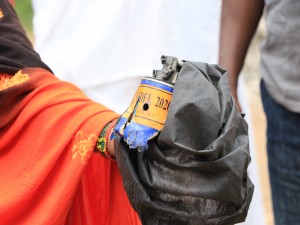
Image:The exploded canister hurled by police into the house of Baby Asenath
The canister that was hurled into the family home of the toddler was then taken into custody by rights defender Rahma Waqo who has been mainstreaming the plight of the family while pursuing justice for the baby.
The canister was handed over to the Independent Policing and Oversight Authority (IPOA) at the Kiamaiko Social Justice Centre on 26 May 2020 in the presence of the Defenders Coalition, media, rights activists and other civil society organizations.
The said incident happened on the night of Friday, 22 May 2020.
The teargas exploded inside her parents’ house on second floor of a residential flat as with the father’s attempt to throw it out proving too late as the baby inhaled the pain-inflicting smoke from the canister.
Later, with other HRDs Defenders Coalition accompanied Rahma and Shamsu Abdikadir( father of the affected baby) to Huruma Police Station where they recorded a statement with police of the incident.
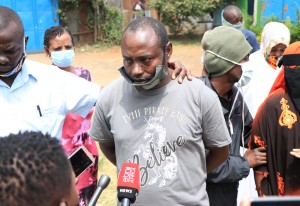
Image: Shamsu Abdikadir father of the affected baby addressing media during the handing over of the canister to IPOA
In solidarity with Mama Rahma Waqo, Defenders Coalition assured Rahma Wako of any support, especially during this time when human rights defenders are grossly targeted by both state and non-state actors because of their work.
“We are concerned by the gross targeting of rights defenders through arbitrary arrests, enforced disappearances and use of other intimidation ploys to frustrate them in their work. Today, as we stand with Mama Rahma we want to assure HRDs of our support in the course of their work,” Said Salome Nduata, Head of Programmes-Defenders coalition
In the month of April, one human rights activist Michael Njau and his two friends went missing and continue to be missing one and half months after alarm was raised on their disappearance on 24 April 2020 in Nairobi. The missing activist is a member of the Kiamaiko Social Justice Centre.
The case which was being handled by Rahma Waqo- a member of Kiamaiko Social justice Centre, was handed over to IPOA for investigations into the near-death experience of Baby Asenath in Huruma, Nairobi.
At the time of handing over of the case, the baby was still under medication at home with complications including nose bleeding and difficulty in breathing.
Police brutality and violence that has led to the needless loss of lives of Kenyans is an age-old systemic problem, with efforts to reform the Kenya Police bearing little fruit.
She called for speedy investigations into the incident to accord the minor justice and stop the police brutality that has since created mistrust between members the public and state agencies.
“Handing over the case gives me a glimmer of hope that the family of Mr. Abdikadir will get justice. Police excesses in this neighbourhood are chocking us!” Said Mama Rahma Wako.
IPOA have since moved on with investigations and the perpetrator is yet to be charged. We await formal updates from the state agency.
REGIONAL CIVIL SOCIETY JOINT STATEMENT ON THE ONSLAUGHT OF CIVIC SPACE DURING THE COVID-19 PANDEMIC RESPONSE IN EAST AFRICA
We, the undersigned representatives of Civil Society Organizations (CSOs) operating within the East African Community and operating under the East African Community (EAC) Consultative Dialogue Framework (CDF) met through a webinar on 19th June 2020, convened by EACSOF Kenya Chapter, to discuss continued threats to civic space due to restrictions imposed as a result of the Covid-19 pandemic. The discussion was prompted by the growing need to foster a more coordinated regional approach to address the severe threats to civic space in the EAC region.
We wish to commend the EAC partner states for taking actions to control the spread of Covid-19. We are aware, however, that various challenges have undermined efforts to have a collective approach to the pandemic. We, nonetheless, congratulate governments in the region for taking the pandemic as a serious threat to the health and wellbeing of their citizens.
State of civil society amidst COVID-19.
The lack of a collective approach based on similar standards has meant that reactions to Covid-19 are largely in line with domestic governance conditions. In countries where civic space was already severely threatened, the directives have tended to be more severe. In such situations, Covid-19 restrictions have merely added to the factors that deny citizens their essential freedoms such as freedom to assemble, freedom to associate, etc.
We note further the rights to information and the freedom of expression have been threatened across the board. In their efforts to control the spread of disinformation, governments have targeted and undermined these rights. Human rights activists and social media influencers are among those who have experienced threats from the authorities due to the information shared on their social media platforms, mainly challenging the government to account for the use of funds. The media and journalists, already under severe constraints in several countries, have faced increasing challenges including threats to suspend licenses and harassment of individual journalists in the course of duty. There has been a surge in cases of police brutality in the process of enforcing restrictions thus undermining ongoing police reforms.
Even though we acknowledge the importance of necessary measures to control Covid-19, the widespread abuses of human rights especially by security forces, have undermined citizens’ faith in what governments are doing to control the spread of the virus. In several cases, this has led to demonstrations, which in turn has created conditions for further spread of the virus. We, therefore, agree with the African Commission on Human and Peoples’ rights and other human rights bodies across the world, which have emphasized that restrictions must be lawful and reasonable.
Given the above, and the need to continue building a prosperous Africa through continental and regional integration, we recommend the following to the governments of the six EAC partner states:
1. That there is a need to recognize and harness the leadership, mobilization and educational potential inherent in the civil society so that a more effective partnership approach is engendered in response to Covid-19;
2. Take immediate action to eliminate Extra-Judicial Killings (EJK) as well as other human rights abuses by security officials in charge of enforcing restrictions. Where such abuses have occurred, responsible state institutions must move with speed to investigate and bring to book those responsible. The state must also provide support to victims of such abuses;
3. That there is a need to continue working towards a collective approach to control of Covid-19 by the EAC partner states. This is partly necessitated by the need to handle practical challenges being currently experienced in the region such as the issue of truckers and movement of goods;
4. The collective approach envisioned above must be human rights friendly in line with the East African Community Treaty, which under “Establishment and Principles of the Community” (Chapter Two) emphasizes “adherence to universally acceptable principles of good governance, democracy, the rule of law, observance of human rights and social justice”;
5. Observe the principles of accountability and transparency in all processes related to control of Covid-19. This includes procurement processes through which countries are sourcing material supplies for purposes of dealing with
the pandemic. Partner States must, at all costs, mitigate against rentseeking, profiteering and other forms of corruption;
6. Support community healthcare systems (such as Community Health Workers) as the first lines of defense in controlling the spread of COVID-19 due to their role in sensitization, supporting vulnerable communities at the
village level, and in urban informal settlements. We note, for example, that community health workers and level one facilities require the provision of adequate protective gear, testing kits, and other materials; and
7. We support partner states call for debt relief to focus more resources on Covid-19. However, this does not preclude the need to bring to account those responsible for the accumulation of odious debts and large-scale looting.
In solidarity with the East African Community, partner states and Civil Society Organizations in East Africa Region.
The statement is endorsed by
1. Tanzania Association of NGOs (TANGO)
2. Defenders Coalition Kenya
3. Development Network of Indigenous Voluntary Association (DENIVA)
4. The Uganda Association of Women Lawyers (FIDA-U)
5. Rwanda Women’s Network
6. Rwanda Civil Society Platform (RCSP)
7. Burundi Journalists Union
8. Forum pour la Conscience et le Development (FOCODE)
9. Community Empowerment for Progress Organization (CEPO),
10. Freedom House, Tanzania
11. Civil Society Reference Group (CSRG)
12. Independent Medico Legal Unit (IMLU
Reflection on the Murder of George Floyd in the USA; Hussein Moyo and 21 other COVID 19 related police killings in Kenya #IcantBreath
Today, I choose to join millions of global citizens to express my outrage over the killing of George Floyd, an unarmed black citizen of United States of America by a white police officer. I strongly condemn the abhorrent killing of George and related murders, and uncalled for excessive police violence against Black people in America. I demand justice for George Floyd.
The repugnant murder of George Floyd by a Minneapolis police officer on May 25, 2020, is just but one of the many documented victims of race profiling and police violence in the United States by police officers against people of color. Ahmaud Arbery and Trayvon Martin are among many other victims of killings on the account of their skin color.
The killing of George exposes murk in race and discrimination in the society which easily permeates systems of governance. The police in the United States have been called out for the excessive targeting of not only the Black people but also such groups like religious, indigenous and ethnic minorities; racialized groups and gender minorities. George’s death and others like him is a reflection of deep rooted societal malaise that counters the imagery of social, economic and political progress and respect for democracy and human rights that the USA has proclaimed itself to be.
As an adept believer in civil rights and freedoms, I bemoan the increasing loss of a global leadership of USA in advocating for human rights respecting policing and upholding the respect for diversity of color, creed, gender, sexual orientation or class.
When one commits to champion the universalism of the UN declaration on human rights that calls on us to stand up against disrespect and violation of human rights, geographical scope and time becomes non-existent. A human rights violation anywhere the world over ought to be condemned.
With this piece, I join with national, regional and global human rights and civil society actors, to call for a thorough, independent, and transparent investigation of the killing of George Floyd and other acts of police violence, and commitment to end impunity for police perpetrators by bringing them to justice. The racial profiling is not unique to the USA alone but also in other parts of the world that have normalized black oppression from all fronts.
The murder of George Floyd has taken place in the midst of an historic global pandemic that has resulted in a serious public health and human rights crisis. It is disheartening that while condemning this travesty of justice elsewhere, Kenya cannot proudly speak of its good record in policing. Extra-judicial killings, enforced disappearance and police violence that has resulted in serious injuries particularly among economically marginalized groups in the Kenyan rural and urban slums have been the hallmark of policing during the COVID 19 crisis.
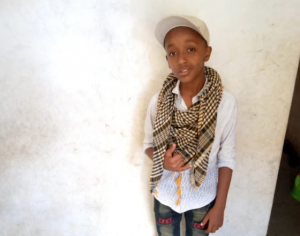
Yassin Moyo, 13, was murdered by a police officer while playing on his family home’s balcony
For instance, figures by Defenders Coalition -an organization that works on protecting human rights defenders against persecution because of their work, indicate that since the first case of COVID 19 infection was reported in Kenya in early March (until 31 May 2020), human tights monitors have documented 21 police killings and hundreds of injuries during violent enforcement of measures intended to minimize the spread of the virus in Kenya. Many more young men have been forcefully disappeared and human rights defenders have been victims of arrests, containment at quarantine facilities and malicious prosecution because of speaking out against human rights violations and other injustices.
Journalists, medical service providers like nurses and medical officers as well as lawyers who are considered as essential service providers have not been spared the violence and ill-treatment. The fear of the violence, more than infections have forced the sick and women in labour to keep off medical facilities, exacerbating the medical crisis now and in the future.
The June 2nd 2020 announcement of the approval – by the Office of the Director of Public prosecutions, of the prosecution of a police officer who is suspected of fatally shooting Yassin Moyo, a primary school pupil at the balcony of their home in Kiamaiko, Huruma in Nairobi provides a glimmer of hope for justice for the family and human rights defenders community that advocate for justice and accountability. Maybe it provides the hope that the wheels of justice in this and other cases will turn so us to slay the dragon of impunity that fuels the never ending police violence against fellow Kenyans.
The boiling outrage against the killing of George Floyd in the United States of America has poured into the streets exposing systemic injustices and discriminatory policing. The government and the American people must make the right choices to right historic wrongs against black people, minorities and open a new chapter on race relation that abhors racism and violent policing of black communities across the world.
Kamau Ngugi,
Executive Director
Defenders Coalition
Photo Credit: Reuters
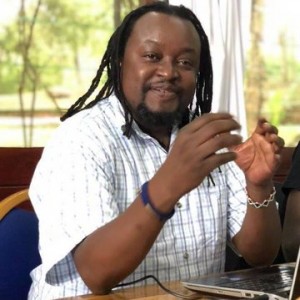
Press Release: For immediate Release
Nairobi, 11th June 2020
Press Statement on the Escalating Reprisals, Intimidation and Harassment of Human Rights Defenders Including Mutemi Kiama In Kenya
Defenders Coalition, which is the National Coalition of Human Rights Defenders in Kenya associates itself with the global campaign to bring to an end systemic discrimination and police violence against black people, who have endured sustained socio-economic and political exclusion the world over.
It is therefore, abhorrent that in the wake of a global ‘I can’t breathe’ movement to bring to an end police brutality. Police officers in Kenya have not only engaged in wide spread brutality against its citizens resulting in death and serious injuries, but have also singled out human rights defenders for intimidation and persecution.
Mutemi Kiama, a human rights defender and blogger is the latest among the growing list of human rights defenders and journalists that have recently survived serious injuries, unlawful arrests conducted violently, detention and malicious prosecutions over criminal charges that were trumped up. Mutemi Kiama was unlawfully arrested on the night of Tuesday, 9 June 2020 after police officers from the Special Crime Unit (SCU) and Karen Police Station forcibly broke into his apartment. His phones, cameras and laptops were confiscated. He was detained at a police station before he was presented to court late evening the following day.
It is dreadful that officers from the Special Crimes Unit, a rebranded police unit that was historically accused for engaging in enforced disappearances, torture and extra judicial killings attempted to circumvent the lawful procedures by re-introducing Mr Mutemi Kiama to court to seek orders to detain him prior to investigation despite contrary advice from the Office of the Public Prosecutor. It took the swift action of the defense legal team comprising of Hon Martha Karua, Harun Ndubi, Lempaa Soyianka and Mbugua Mureithi and an officer from the ODPP who arrived at Kibera Court in the nick of time, where the officers had sneaked the suspect without the knowledge of the lawyers and sought orders to detain him. The defense and prosecution refused to acquiescence on application by the police to have Mutemi detained for a week as they conducted investigation over an alleged crime of Digital Piracy. The court dismissed the application and affirmed the right of the rights defender/blogger to be set free as the police conduct their investigations. His tools of trade remain confiscated.
The Defenders Coalition condemns this unlawful arrest of Mutemi Kiama. Defenders Coalition believes in the rule of law and the right of the police to conduct their work freely, but lawfully. However, the conduct of the police to forcibly enter a private residence of the defender late in the evening without court sanctioned order, the use of violence against the defender during the arrest, and attempts to hold the rights defender incommunicado following arrest and forum shopping in an attempt to seek favourable court orders to detain the blogger before preferring any charges, demonstrate keenness to circumvent the rule of law with the aim to persecute or humiliate the defender.
These deplorable actions by the SCU police fall in a concerning pattern of escalating intimidation of human rights defenders in the country in the recent months.
To highlight, Collins Ochieng and Samuel Gathanga of Ruaraka Social Justice Centre, were detained at the Central Police Station on 9 June 2020. They were arrested by police officers shortly after delivering a petition to Parliament regarding police brutality within informal settlements in Nairobi. The two were booked in with charges of failure to keep social distance and failing to wear face masks contrary to the directives given for managing spread of COVID-19. The two have insisted that they were not in contravention of the rules and that the charges were trumped up. The two were released from custody after posting cash bail. They are expected to appear in court on Tuesday 16 2020 to be formally charged.
On 12 May 2020, woman human rights defender Ruth Mumbi received a message from an unknown number, threatening to make her “d

CALL FOR EXPRESSION OF INTEREST
TERMS OF REFERENCE FOR RESEARCH CONSULTANT FOR UPDATING THE SURVEY ON COMMUNICATION SURVEILLANCE AND PRIVACY OF HUMAN RIGHTS DEFENDERS
Title: Consultancy – Survey Report reviewing and updating
Expected start date: Immediately
Contract Period: 14 working days
Who we are
Defenders Coalition (The National Coalition of Human Rights Defenders–Kenya) is a national organization incorporated in the Republic of Kenya as a Trust. Its mission is to strengthen the capacity of human rights defenders (HRDs) to work effectively in the country and to reduce their vulnerability to the risk of persecution, through protection, capacity building, and advocacy for a favorable legal and policy environment. Established in 2007, NCHRD-K is the only national organization that works primarily for the protection of HRDs.
Background:
Defenders Coalition set out a survey to assess Human Rights Defenders (HRDs) level of exposure, understanding, and perception of communication surveillance as well as identify their strategies for mitigating the same in 2018. As enshrined in the CoK under Article 31, the right to privacy is a fundamental right protected in law across the world jurisdictions. Needless to say it is essential in providing the prerequisites for the protection of human dignity and enjoyment of the bill of rights.
The report analyses the needs, concerns and areas of interest for HRDs in relation to privacy, data protection, and communications surveillance and establishes the impact surveillance has on the work of HRDs. The report also offered recommendations to various actors including HRDs to develop appropriate, timely interventions and advocacy strategies. The enactment of the Data Protection Act 2019 was a big step in the realization of the Right to Privacy and protection for HRDs especially against surveillance. A lot remains to be done especially with the proposed amendments to the Official Secrets Act which in this light seeks to negate the right to privacy and give the authorities an upper hand.
Now more than ever efforts should be made to ensure that the checks and balances which are at the heart of the DPA are enforced and implemented.
Scope of the work
The consultant’s main duty shall be based on two specific tasks:
Expected Deliverables
Timeframe: 14 Working Days
Required Expertise and Qualifications
Application Procedure
Qualified consultants must include in their application the following:
2. Financial proposal not exceeding 1 page
3. Organizational and Personnel Capacity Statement
SUBMISSION OF PROPOSAL
Interested and qualified consultants should submit their application on or before 24th July 2020 to:
Kamau Ngugi
Executive Director
Defenders Coalition
Email: info@defenderscoalition.org
Defenders Coalition is an equal opportunity employer. Persons from minority groups, indigenous groups, women and persons with disabilities are encouraged to apply. All applications will be treated with the utmost confidence.
17 May 2020
Press Release: INTERNATIONAL DAY AGAINST HOMOPHOBIA,BIPHOBIA,INTERPHOBIA AND TRANSPHOBIA (IDAHOBIT) 2020
Defenders Coalition was delighted to join Kenyans and people across the world in marking the 2020 annual International Day against Homophobia, Biphobia, Interphobia and Transphobia (IDAHOBIT).
This day May 17th was specifically chosen in 2004 to commemorate the World Health Organization’s decision in 1990 to declassify homosexuality as a mental disorder.
It is meant to draw world attention to the untold violence, stigmatization, harassment, othering and discrimination experienced by people with diverse sexual orientations, gender identities or expressions, and sex characteristics.
These people include intersex, lesbian, gay, bisexuals, transgender and gender non-conforming persons.
Defenders Coalition is happy to acknowledge the realization of key milestones in Kenya that will eventually shape the space within which this community exists. Due to a government taskforce on to interrogate the plight of Intersex Persons and give recommendations to the state, Intersex Persons who many a times a marginalized, minority and vulnerable group that continues to face a multitude of challenges and human rights violations from birth including stigmatization, ridicule and discrimination have since been recognized as a gender.
For the first time in history, they were recognized by the Kenyan government , by being counted during the 2019 National Census conducted in August 2019.
This year’s commemoration comes at a time when the world is facing a Covid-19, a pandemic that has threated not only the safety of global citizens but their livelihoods and wellbeing occasioned by a common mitigation effort “social distancing”.
COVID-19, on its advent, has imposed on LGBTI people an unprecedented dual reality – the need for community clashing with the imposed necessity for social distancing – when expressly LGBTI persons have been and continue to be victims of the most extreme forms of social, legal and religious distancing known for the longest time.
It is paramount to note that while many societies around the world have made progress in the acceptance and inclusion of LGBT+ people, Kenya continues to criminalize certain sexual orientations thus LGBT+ people are not entirely safe.
Domestic violence by close relatives and irrational family members continues to be predominant form of violence extended to LGBT+ people even in the absence of the pandemic. The situation has worsened due to teeth wrenching effects of Corona virus disease. It has been amplified now that many LGBT+ people have been forced to return to hostile family homes due to loss of livelihoods.
Defenders Coalition understands that for LGBT+ people today, the situation is dire. We endeavour to continue working to mitigate the risks, security and safety threats that have been amplified by COVID-19.
Defenders Coalition urges the Kenyan Government to expressly meet its commitment under the United Nations Universal Periodic Review (UPR) and adopt a comprehensive equality and non-discrimination law, granting protection to all individuals, irrespective of their sexual orientation, gender identity, expression and sex characteristics for a long term, comprehensive, sustainable frameworks that will ensure genuine, lasting inclusion and acceptance of LGBT+ people.
To the sexual and gender minorities, the Defenders Coalition celebrates you on this day and affirms you of our commitment to champion your rights for your holistic socio-economic wellbeing and general safeguarding of your dignity.
Defenders Coalition
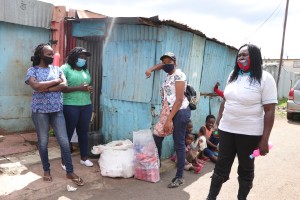
#ShujaaMtaani
Christine Wandera is a WHRD, community organizer and sociologist from Maringo, Makadara Constituency in Nairobi County, a once residential area exclusively for officers to working in the government during the post-colonial Kenya. In recent times, the estate is inhabited by both young and old (Retired) low income earners to poor in-city informal settlements that stretch on most of the estate’s streets.
When the first case of Covid-19 was announced in Kenya, many alike, expressed fear of the unknown and the unprecedented disruption, loss of livelihoods and and life that the disease could impact communities. Christine was one of them. at that point, she knew that she had a critical role to play in the society as a leader to ensure safety of the people.
Quickly, Christine put together a team of women- majority were trained community workers and volunteers- whom she then volunteered to train on liquid soap making. Her plan was to make the soap, and distribute it for free to community members even when she knew that she did not have sufficient economic muscles to sustain the activity. They named the group M-Finest for Maringo Finest.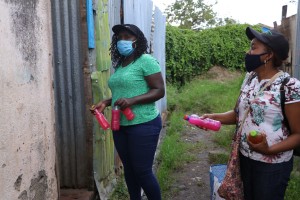
Together with the volunteers, embarked on distributing soap in half a liter recycled bottles. They would distribute the soap to the vulnerable and exposed members of the community such as vendors, needy and the old. They also launched a hand washing campaign where they demonstrated how to wash hands with the following messages:
They continue to sensitize community members about the disease with the help of donations from well wishers in the form of face masks, sanitizers, food stuffs and funds for producing more soap.
She has also offered free counselling to victims of gender based violence during the corona period as well as training their immediate family members of the best practices of handling the victims.
M-Finest has been able to reach over 2000 households through the distribution of over 1000 masks, produced 500 litres of liquid soap and even shared soap with Jogoo Police Station Officers.
#ShujaaMtaani
Brenda Cheboi is a young Indigenous Persons activist from the Sengwer community whose ancestral home is in Embobut Forest in Elgeyo Marakwet County.
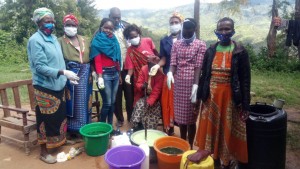
Brenda works towards the realisation of an enabling environment for youths and young girls in the community to become economically empowered to reduce the national unemployment rate of 35% amongst youths in Kenya.
She also advocates for land justice, zero sexual and gender based violence and continuously challenges oppressive patriarchal norms within her society.
A teacher by profession, Brenda has been instrumental for her community by being the translator and interpreter of government messaging on Covid-19 management guidelines. She uses participatory theatre to sensitize community members in their homesteads.
Moreover, she has used the same approach to engage community members who cannot read and write about land justice and the Constitution of Kenya.
During the coronavirus pandemic, Brenda’s skills on liquid soap making were enhanced by the Defenders Coalition. Through the training, Brenda has passed on the skills to Sengwer Youth and Women through regular training. She has overseen the making of over 300 litres of liquid soap by trainees, which is then distributed to community members and neighbours for free.
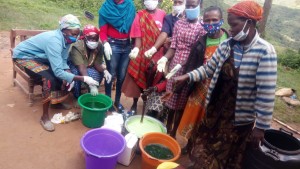
With the help of the new trainees, Brenda continues to rally and sensitize community members on the need to maintain high hygiene standards to combat the spread of the virus and also for personal health and wellbeing. Through her efforts they have been able to distribute soap to all homesteads within their locality.
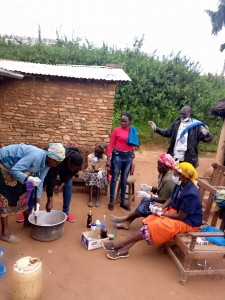
#ShujaaMtaani
Mary is an Indigenous Woman Human Rights Defender from the Indigenous Persons Community- The Sengwer – whose ancestral land is in Embobut Forest in Elgeyo Marakwet County.
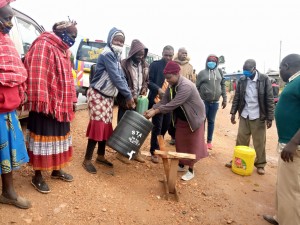
She is the chairperson of the Sengwer Women Group, a group that has been on the forefront mainstreaming the plight of women and young girls from Embobut Forest and how the government’s eviction from the said forest has worsened the situation of gender justice.
She is a Lands Rights activist advocating for the ancestral land rights for her community and a strong Women’s right champion within her community.
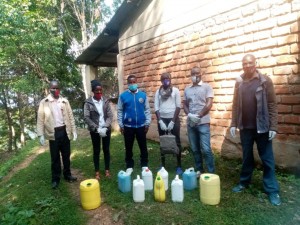
Mary with youths in Kabolet, Cherangany( where Some of the Sengwer Indigenous Persons live) getting ready for liquid soap distribution
During Covid-19, Mary and members of the group took it upon themselves to sensitize community members on Covid-19 and the best personal etiquette and public health practices that would ensure curbing of the disease and as per government directives.
Further, she heads the group in liquid soap making. Mary then distributes the soap from door to door and it is at this activity that she gets the opportunity to sensitize community members.
Beneficiaries of her work do not only hail from Elgeyo Marakwet. She has gone as far as to Kabolet, Cherangany in Trans-Nzoia County, where she has been imparting women with soap making skills. A section of The Sengwer Indigenous Persons live in the area too.
The community members lead an impoverished life as a result of the government’s violent evictions from their ancestral home. The evictions disrupted the socio-economic wellbeing and co-existence of the Sengwer Community and Embobut Forest.
Therefore, there are not enough disposable incomes that would otherwise promote access to commodities such as soap and other essential items aiding the fight against the spread of coronavirus disease.
Mary has been a key figure in combating police harassment within her community and speaking up against excessive force unnecessarily meted upon locals in the wake of enforcing government measures.
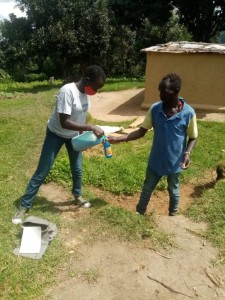
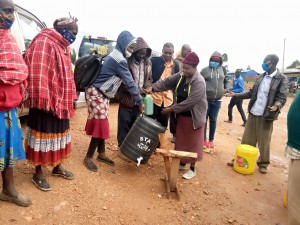
Mary Komen with Group Members distributing liquid soap In Elgeyo Marakwet West